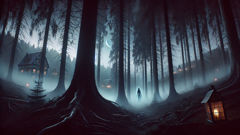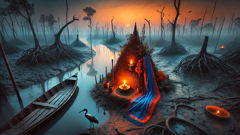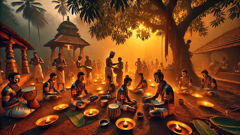Introduction
Mist seeps between the trunks of ancient firs, and the Black Forest grows restless beneath a moon that can barely pierce the tangled canopy. In these woods, where the air tastes of moss and secrets, the villagers of Eichenruh have always whispered of things best left unnamed. It’s a land where stories are currency, and none are traded more cautiously than those about the Drude—a witch or spirit, some say, who comes at night to ride the chests of sleepers, stealing their breath and twisting their dreams into nightmares. Some claim to have seen her: a gaunt woman with tangled hair, her face more shadow than flesh, moving through the mists as silent as the grave. Others insist she’s nothing but a legend, a tale to frighten children and explain the night terrors that occasionally grip the most pious men. But as dusk stretches into an uneasy night and an unnatural cold settles over Eichenruh, old fears awaken. Children wake screaming, elders mutter prayers, and even the bravest find their beds less comforting than before. For in this season, the boundary between myth and reality is thin as a spider’s thread. At the heart of the village, a healer named Grete suspects there is more to these nightmares than mere superstition. Her own dreams have grown troubled, haunted by a suffocating presence and the echo of ancient songs. As the Drude’s shadow lengthens over the Black Forest, Grete must unravel truth from fable before fear tears Eichenruh apart, or the witch’s curse claims them all.
Nightmare's Embrace: The First Victim
The terror began with a single, terrible night. It was the first new moon of winter, when Eichenruh seemed to shrink beneath the weight of darkness. Smoke curled from chimney stacks, and families huddled close to their hearths, clutching charms and muttering litanies against things that moved unseen in the gloom. In the home of Otto Becker—the miller’s son—the air was especially heavy. Otto, strong as an ox and usually untroubled by superstition, was the first to fall prey to the Drude.
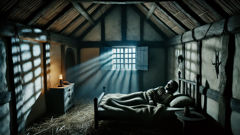
Otto’s mother, a stern widow named Gertrud, was awakened in the early hours by guttural gasps. She found her son sprawled atop his straw mattress, arms and legs pinned by invisible force. His eyes were wide and bloodshot, his lips tinged blue as if he’d drowned in his own bed. Gertrud shook him, calling his name, but Otto could only croak out a few words—"Heavy… She’s here… Can’t breathe…"—before falling limp, breath shuddering in shallow bursts. The physician summoned from the neighboring town found no sign of fever or wound. The only clue: deep, bruising marks across Otto’s chest, shaped like a woman’s hand, and a faint, oily scent lingering in the room. It was Grete who recognized the signs. She’d seen it once before, years ago, when a traveling peddler died in his sleep after boasting of his luck at cards. The villagers spoke of an Alp or a Mare then, but Grete remembered her grandmother’s stories—the Drude, who presses on sleeping chests until breath is stolen, and nightmares reign.
The next night, it happened again. This time to old Frau Lenz, the midwife, who had delivered nearly every child in Eichenruh. She awoke screaming, clutching her chest, sweat pouring down her face as she raved about a gaunt woman with eyes like coal and fingers cold as the grave. Her voice trembled as she described the sensation—a weight crushing her, a song so old and bitter it turned her blood to ice. The village priest, Father Matthias, called for prayer and confession. Suspicion began to swirl as thickly as the winter mist. Was this a curse? A punishment? Or the work of a witch hiding among them? Doors were barred at night, and sleep became a fearful ordeal. When cows went dry and bread soured overnight, whispers grew louder. Some blamed the woods. Others eyed their neighbors with mistrust, wondering who might have consorted with dark forces. Grete watched all of this with mounting dread. She tended to Otto and Frau Lenz, but the remedies of root and prayer did little to ease their suffering. In her own dreams, the same shadow crept ever closer—a woman with hair tangled like brambles, her voice a susurrus of ancient words. Each morning, Grete woke breathless, the taste of fear sharp on her tongue. She knew the Drude would not stop at two.
The Healer’s Search: Roots of the Curse
Sleep fled from Eichenruh. Doors were locked, candles burned through the night, and children huddled beneath rough woolen blankets, clutching sprigs of blessed yarrow. The Drude’s grip tightened; each dawn brought new tales of breathless terror. Some villagers bore bruises shaped like fingers, while others woke with bloodied lips, having bitten through their own tongues in the throes of nightmares. Old men recalled stories from their fathers—of bargains struck in darkness, of witches hanged at the edge of the forest and curses that festered like wounds left to rot.
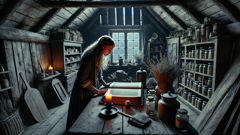
Grete moved from house to house, her satchel full of herbs and amulets. She listened more than she spoke, collecting fragments of dreams: a black river winding through endless trees, the sound of wings in pitch darkness, the scent of burning feathers. She saw the fear in every face—fear that the Drude was not just a story but a punishment for forgotten sins. In the quiet moments between patients, Grete searched her grandmother’s grimoires by candlelight. She read of witches marked by the Drudenfuss—a five-pointed star—said to repel the spirit’s touch. She brewed protective teas of mugwort and valerian, hung sprigs of rowan above beds, and traced protective sigils on the thresholds. But still, the Drude came. Grete began to suspect there was more to the curse than simple malice. The patterns of attack were too precise: only those who had quarreled with neighbors or withheld kindness seemed to suffer most. The witch’s vengeance, it seemed, was fueled by bitterness and old grudges.
In her search for answers, Grete visited the oldest woman in Eichenruh—Ursula, blind and half-mad, who remembered when the trees were young. Ursula told her a story whispered since before the village had a name. Once, a woman named Adelheid had been accused of witchcraft after a child’s death during a fever. Falsely blamed and cast out into the woods, Adelheid died in exile, vowing that those who turned on their own would never rest easy. The forest, Ursula warned, never forgets. Grete’s blood ran cold. Was the Drude not merely a spirit, but the vengeful soul of Adelheid, called forth by the village’s own cruelty? As Grete left Ursula’s hut, a biting wind tore through the trees. The sun was setting, and the forest seemed to lean in, hungry for secrets.
Beneath the Fir Boughs: Confronting the Drude
The night the Drude claimed her third victim, panic swept through Eichenruh. The schoolmaster’s wife, once the kindest woman in the village, was found cold and still, her lips blackened and eyes wide with terror. Father Matthias led processions through the night, swinging censers of incense and chanting prayers, but the fear only deepened. Rumors flared like wildfire: some accused Grete of consorting with dark forces; others suspected a pact between the priest and the forest spirits. Neighbors who had once shared bread now glared at each other across fences. The air was thick with suspicion and grief.
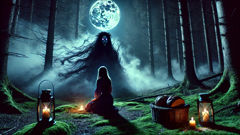
Grete, her courage hardening under pressure, knew something had to change. If the Drude was Adelheid’s vengeful ghost, then only a gesture of true contrition and unity could break the curse. She gathered the villagers in the square beneath the ancient linden tree—a tree that had seen every sorrow and celebration in Eichenruh. There, by torchlight, she told Ursula’s story aloud. Grete urged the villagers to confess old wrongs, to forgive past grievances, and to reach out to one another. At first, voices were raised in anger and denial. But as the flames flickered and the wind howled through the branches, old wounds surfaced. Tears fell as confessions tumbled forth: a stolen loaf of bread, a love betrayed, a kindness withheld. Grete placed a circle of salt around the villagers and inscribed the Drudenfuss in the earth at their feet. The oldest and youngest of Eichenruh joined hands, and together they offered prayers—not just for protection, but for forgiveness.
That night, Grete made her way into the heart of the Black Forest alone. Carrying only a lantern, her grandmother’s talisman, and a piece of freshly baked bread—an offering for Adelheid—she followed the path to the place where the exiled woman had died. The forest pressed close, branches clawing at her cloak. Shadows flickered at the edge of her vision. In a clearing washed with moonlight, Grete found herself face-to-face with the Drude. The witch’s form was insubstantial, woven from mist and malice, eyes burning with ancient grief. Grete knelt and laid the bread on a flat stone, bowing her head in apology and remembrance. She spoke words of sorrow for Adelheid’s suffering and begged for the village’s release from vengeance.
For a moment, silence hung heavy as a shroud. Then the Drude’s form shifted—the face grew softer, sorrowful. A chill wind swept through the clearing, carrying with it a sigh as old as the forest. The Drude reached out, fingers like smoke, and brushed Grete’s brow. The pressure that had haunted Eichenruh for so many nights lifted. When Grete returned at dawn, she found the village blanketed in peace. The nightmare had broken.
Conclusion
With the breaking of the Drude’s hold, Eichenruh slowly stitched itself back together. The villagers—once divided by fear and suspicion—found new strength in forgiveness and unity. Children no longer woke screaming; hearth fires burned brighter, untroubled by the weight of dread. Grete became more than a healer; she was now a keeper of memory, reminding her neighbors that the forest’s shadows are made darker by their own hearts’ secrets. Yet the legend of the Drude endured. Each winter, as nights lengthened and mists thickened among the firs, stories of Adelheid were retold by candlelight—not as a warning of vengeful spirits alone, but as a lesson in compassion and remembrance. For in the Black Forest, where old wrongs linger like fallen leaves and the line between myth and truth blurs with every breath, it is kindness that keeps nightmares at bay. And still, when the wind moans through the branches and frost feathers the windows, some say you can hear a gentle sigh—a spirit finally at rest.

